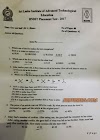Click on the tabs to see the Detailed Syllabus:
Module Details
| Module Code | HNDIT1103 |
|---|---|
| Module Title | Structured Programming |
| Credits | 04 |
| Hours /Week |
Lectures - 30 Lab/Tutorial - 60 |
| Semester | 1 |
| GPA/NGPA | GPA |
| Module Type | Core Compulsory |
Module Aims & Objectives
Envisage skills for the development of application programmes through systematic
problem solving skills.
Learning Outcomes
At the end of the module the student will be able to:
▪ Apply systematic approach to problem solving .
▪ Design, compile and execute C++ programs to solve basic problems.
▪ Use appropriate data types for representation of data within a programme.
▪ Use appropriate control structures for defining logical instruction flow.
▪ explain the difference between call by value and call by reference.
▪ understand the dynamics of memory by the use of pointers.
▪ use different data structures and create/update basic data files.
▪ Apply systematic approach to problem solving .
▪ Design, compile and execute C++ programs to solve basic problems.
▪ Use appropriate data types for representation of data within a programme.
▪ Use appropriate control structures for defining logical instruction flow.
▪ explain the difference between call by value and call by reference.
▪ understand the dynamics of memory by the use of pointers.
▪ use different data structures and create/update basic data files.
Outline Syllabus
1. Program design tools – Flow chart/pseudo codes
2. Introduction to C++ development environment
3. C++ Program Structure
4. Data types, Variables and Constants
5. Expressions, Statements, and Operators in C++
6. Language control structures (sequence, selection and repetition)
7. Branching and Recursion
8. Console I/O functions
9. Structured Data Type : Arrays
10. Functions
11. Pointers
12. Structures
13. File handling and File based input / output
14. Fundamentals of program testing and debugging
2. Introduction to C++ development environment
3. C++ Program Structure
4. Data types, Variables and Constants
5. Expressions, Statements, and Operators in C++
6. Language control structures (sequence, selection and repetition)
7. Branching and Recursion
8. Console I/O functions
9. Structured Data Type : Arrays
10. Functions
11. Pointers
12. Structures
13. File handling and File based input / output
14. Fundamentals of program testing and debugging
Assessments
| Type | Activity | Weighting |
|---|---|---|
| Continuous Assessment | Tutorials and Lab Assignments related to Classroom Teaching | 20% |
| Mini Programming Project | 30% | |
| Semester Examination | Final Structured Paper | 50% |
Recommended Learning Activities
Fundamentals covered in classroom teaching supported by :
laboratory assignment
e-Learning material
hands-on lab sessions
Self-guided mini programming project.
laboratory assignment
e-Learning material
hands-on lab sessions
Self-guided mini programming project.
Resources: Equipment, Tools and Materials
Access to computer lab with C++ development environment
Access to Internet and Online learning materials
Access to Internet and Online learning materials
Prescribed Books
[2]. Deitel and Deitel, C++ How To Program J. R. Hubbard, Schaum's outline of theory and problems of programming with C++, McGraw-Hill, ISBN13: 9780070308374





0 Comments